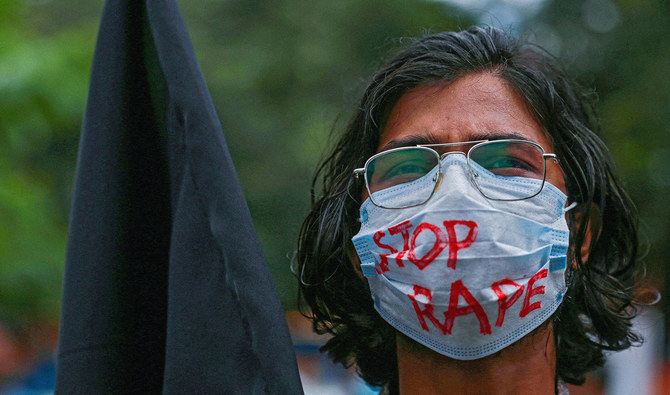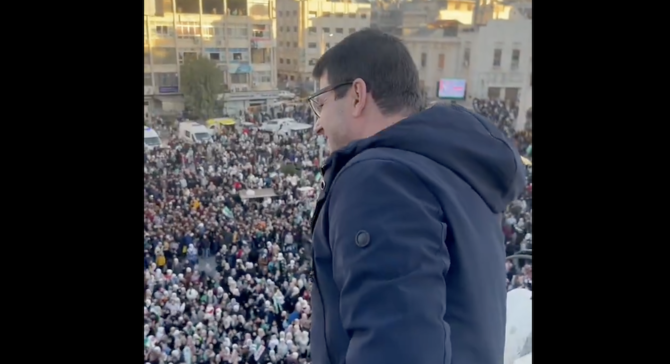DHAKA: A new app funded by the brother of a rape victim aims to reduce sexual violence against women in Bangladesh, where despite increased punishment the prevalence of the crime has been on the rise.
At least 1,247 women were raped in Bangladesh, while 286 faced rape attempts in 2021, according to Bangladeshi human rights group Ain O Salish Kendra. Forty-six of the victims died following rape, while nine committed suicide.
Ain O Salish Kendra’s 2021 statistics showed a rise of 25 percent in rape cases from the year before. The increase was observed despite the introduction of capital punishment for rapists, which the government passed in October 2020 following nationwide protests sparked by a series of high-profile rape cases that year.
The numbers are just the tip of the iceberg, as rights activists say most women do not report rape, fearing victim-blaming and stigmatization and not believing they would get justice. According to Human Rights Watch, less than 1 percent of reported perpetrators in Bangladesh are convicted.
The new app, Bachao (Save Me), aims to stop the crime before it happens. The app’s founder, Jalal Ahmed Mirza, hopes it will be able to reduce the prevalence of rape at least by half.
“My sister was a rape victim, and she suffers from trauma to date. My mother died due to this shock. As a last wish, my mother asked me to do something to protect the girls of the country,” he told Arab News.
“Our target is to halve the rape rate per day from 17 to eight.”
Mirza, a 45-year-old IT professional, founded Bachao as a non-profit initiative but would need support to be able to expand it to the level of unions — the smallest local government units in the country.
“We have spent around $100,000 from our own funds,” he said. “We must work in 4,500 unions of the country, and this requires support from the government, the private sector, NGOs and the public.”
Since its launch in October, Bachao has already been downloaded by 160,000 smartphone users from Google’s Play Store.
When in danger, a user can press the panic button to call volunteers who would track down her location through GPS. If no rescue arrives within 20 minutes, Bachao’s monitoring team would share the victim’s coordinates with the nearest police station.
The app’s data shows over 170 successful interventions have been conducted by volunteers in the past three months.
One of them involved Monica Begum, a 25-year-old garment factory worker in Dhaka, who pressed the panic button in October.
“After regular office hours, when everyone left the factory, Begum was asked by her superior to stay. At that moment, she sensed something was wrong and felt an imminent danger. She pressed the Bachao alert button, and her colleagues were alerted and intervened,” Bachao’s support team member Zeba Fariha said.
Another rescue, in November, involved 16-year-old Sultana Akter, a 10th grader in Matuail, some 7 km from the outskirts of Dhaka.
She clicked the panic button when she was followed by a group of men on her way home in the evening.
“Within a few minutes, her relatives rushed to the spot following the GPS location and rescued her,” Fariha said.
While police were involved in three incidents reported via the Bachao app, a spokesman of the police headquarters in Dhaka said they should be involved in interventions from the very beginning to avoid possible abuse.
“There are chances that some innocent people might be framed,” Additional Inspector-General Mohammed Kamruzzaman told Arab News. “People shouldn’t be abusive while using this type of initiative.”
But women activists are of a different view.
“Sometimes we also notice that people make prank calls to the emergency national helpline. But we don’t consider stopping the helpline’s services,” renowned human rights advocate Khushi Kabir told Arab News.
“There might be some chances of abuse whereby innocent people may fall victim. Police may investigate such incidents.”
She added that Bachao should expand its coverage by introducing shortcodes to be available for all mobile phones, not just for smartphone users.
“People’s intervention before the crime takes place is a good initiative,” Kabir said. “In most cases, women become victims of rape and violence by people they know, sometimes relatives within the family, and it mostly happens in victim’s locality. So, this Bachao app would help women in case of emergency.”
Salma Ali, president of the Bangladesh National Women Lawyers Association, said the app should be promoted.
“Different rights groups in the country should be engaged so that the nation can build a spontaneous movement over violence against women,” she told Arab News. “The government should also extend its support to make the app more popular.”



























